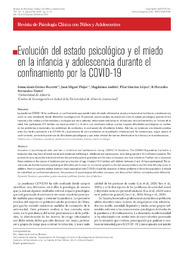Por favor, use este identificador para citar o enlazar este ítem:
https://hdl.handle.net/11000/27619Registro completo de metadatos
| Campo DC | Valor | Lengua/Idioma |
|---|---|---|
| dc.contributor.author | Gómez-Becerra, Inmaculada | - |
| dc.contributor.author | Flujas, Juan Miguel | - |
| dc.contributor.author | Andrés, Magdalena | - |
| dc.contributor.author | Sánchez-López, Pilar | - |
| dc.contributor.author | Fernández-Torres, Mercedes | - |
| dc.contributor.other | Departamentos de la UMH::Psicología de la Salud | es_ES |
| dc.date.accessioned | 2022-09-12T11:52:10Z | - |
| dc.date.available | 2022-09-12T11:52:10Z | - |
| dc.date.created | 2020-09 | - |
| dc.identifier.citation | RPCNA Vol.7 Nº 3 (2020) | es_ES |
| dc.identifier.issn | 2340-8340 | - |
| dc.identifier.uri | https://hdl.handle.net/11000/27619 | - |
| dc.description.abstract | La pandemia COVID-19 ha conllevado un confinamiento que puede haber afectado al bienestar social y emocional en la infancia y adolescencia, como se está estudiando desde diferentes investigaciones. El presente estudio analiza las relaciones entre el estado psicológico general de los menores y los miedos a enfermedades y contagios por virus; además, valora estas relaciones en el trascurso del confinamiento y en función de la edad. Han participado 972 familias con hijos/as entre 3 y 18 años. Los resultados indican que las mayores dificultades psicológicas se centran en los problemas emocionales, los problemas de conducta y la puntuación de dificultades totales. Además, se evidencia una relación positiva entre los miedos asociados a la COVID-19 y la presencia de esos problemas en la población infanto-juvenil. Se destaca que, según avanza el confinamiento, aumenta la presencia de dificultades psicológicas y que estas afectan de manera diferencial en la infancia y en la adolescencia. | es_ES |
| dc.description.abstract | Evolution of psychological state and fear in childhood and adolescence during COVID-19 lockdown. The COVID-19 pandemic has led to a lockdown that may have affected social and emotional well-being in childhood and adolescence, as is being explored from different research. The present study analyses the relations between the general psychological state and the fears of diseases and virus infections. Furthermore, it assesses these relations in the course of lockdown and as a function of age. A total of 972 families with children between 3 and 18 have participated. The results indicate that the highest psychological difficulties are focused on emotional symptoms, the behavioral problems and the total difficulty score. In addition, there is a positive relation between fears associated with COVID-19 and the presence of these problems in the infant population. It should be noted that, as confinement advances, the presence of psychological difficulties increases, and these affect children and adolescents differently. | es_ES |
| dc.format | application/pdf | es_ES |
| dc.format.extent | 8 | es_ES |
| dc.language.iso | spa | es_ES |
| dc.publisher | Universidad Miguel Hernández de Elche | es_ES |
| dc.rights | info:eu-repo/semantics/openAccess | es_ES |
| dc.rights | Attribution-NonCommercial-NoDerivatives 4.0 Internacional | * |
| dc.rights.uri | http://creativecommons.org/licenses/by-nc-nd/4.0/ | * |
| dc.subject | Pandemia | es_ES |
| dc.subject | cuarentena | es_ES |
| dc.subject | problemas psico-emocionales | es_ES |
| dc.subject | familias | es_ES |
| dc.subject | miedo al contagio | es_ES |
| dc.subject.other | CDU::1 - Filosofía y psicología::159.9 - Psicología | es_ES |
| dc.title | Evolución del estado psicológico y el miedo en la infancia y adolescencia durante el confinamiento por la COVID-19 | es_ES |
| dc.type | info:eu-repo/semantics/article | es_ES |

Ver/Abrir:
004_0.pdf
233,23 kB
Adobe PDF
Compartir:
 La licencia se describe como: Atribución-NonComercial-NoDerivada 4.0 Internacional.
La licencia se describe como: Atribución-NonComercial-NoDerivada 4.0 Internacional.
.png)